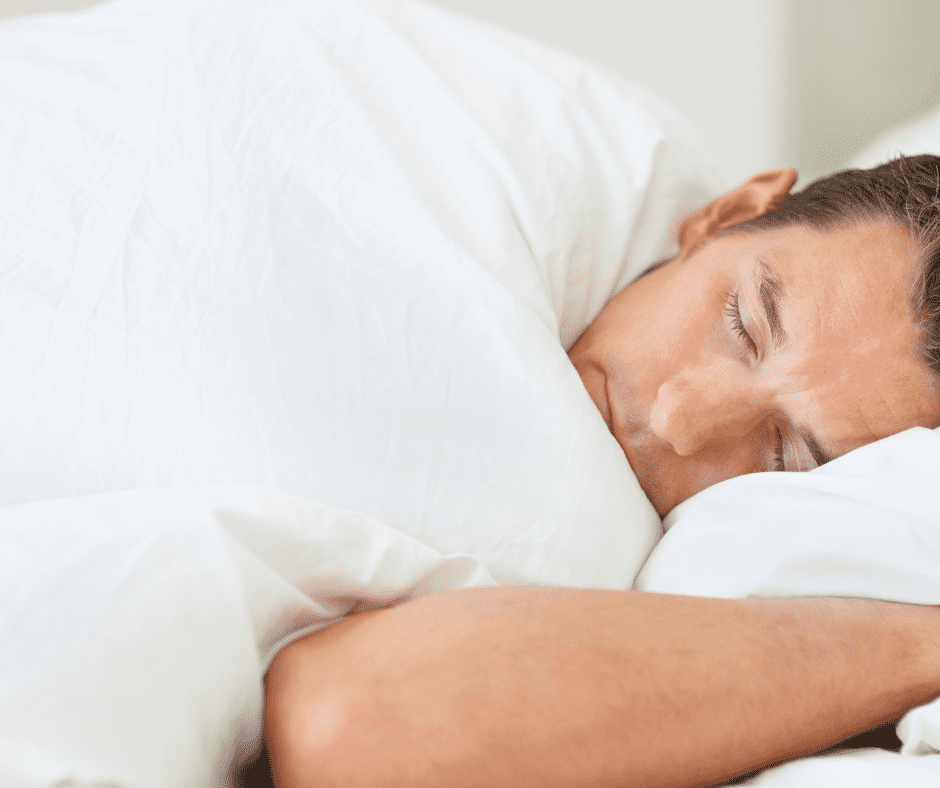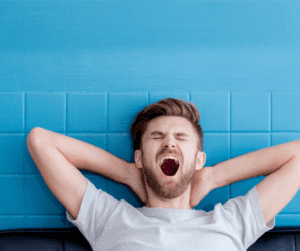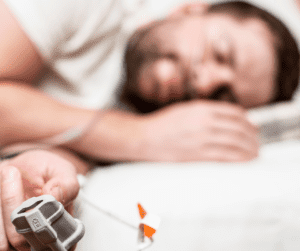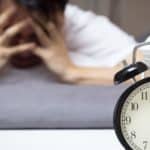We all do it… Every night… sometimes even in the afternoon, and if we’re fortunate, sometimes we even get to do it mid-morning after a long run…
What I’m talking about is sleep.
It’s no secret that as runners we are more often than not sleep-deprived. Like any other human, we find ourselves juggling too many things and trying to fit them all into one day. The days just never seem to have enough hours in them to even think about including a decent night’s sleep on the “To-Do List”.
You need to address the quantity of sleep that you get each night if you feel tired in the day after getting less than 7 hours of sleep. If you are getting the recommended 7-9 hours of sleep and you still feel tired during the day then you need to address the quality of the sleep you’re getting each night.
Let’s find out of you’re getting enough sleep or not… In this article, we’re going to be covering:
- The four stages of sleep
- If runners require more sleep than most
- If 6 hours of sleep is enough for a runner
- The effect of sleep on your running performance
- The minimum amount of sleep a runner should be getting
- How to track your sleep
- Top tips to ensure a good quality sleep
Let’s begin…

The Four Stages Of Sleep
Although you are unaware of what goes on while you’re asleep, your brain and body are in an active state.
Your night’s sleep is divided into four different stages and they all have an impact on how your body and brain function the next day.
Now that we know what happens in each stage of sleep… We can have a look at how much sleep runners really need.
Do Runners Require More Sleep Than Most
Getting enough sleep and extra is definitely worth it if you are a runner. It’s one of those “free” things that will help your performance without even running.
According to several studies, extending the amount of time you sleep will improve your running performance.
Scientists found in one study that endurance athletes who slept for an extra 90 minutes for 3 days in a row were able to improve their running performance by 3%.
If you want to run faster and longer then increasing the number of hours you get every night is the way to go.
Did you know that Eluid Kipchoge (considered the greatest marathon runner of all time) sleeps for 10 hours a day? He gets 8 hours at night and two hours during naps.
The fact is that sleep is extremely crucial for your muscle and tissue repair, when you run, you aren’t just building your stamina and strength; you’re also breaking your body down, causing a tiny amount of tissue damage with every step.
So, allowing yourself time to recover after your runs is what makes it possible for you to come back better adapted for your next run.
Did you know that Paula Radcliffe ( 3x winner of the London Marathon, 3x winner of the New York Marathon, Chicago Marathon winner, and held the Women’s World Marathon Record with a time of 2:15:25 for 16 years) would sleep 8-10 hours a night and sleep for a few more hours in her afternoon naps?
Runners do need more sleep than non-runners for the following reasons:
- Build Muscle & Repair Tissue
- Athletic Performance
- Hormonal Balance
- Water Reabsorption
- Concentration
- Reduce Injury Risk
- Immunity Boost
We will dive deeper into each of these further in the article.
Sometimes, things just don’t go to plan, and going to sleep late is inevitable… Meaning you’re only going to be getting a few hours of sleep… Does that mean you should skip out on your run in the morning?

Let’s find out…
Is 6 Hours Of Sleep Enough For a Runner?
We’re not going to tell you not to run if you’ve only had 6 hours of sleep because it depends on a few different factors. The important thing to take note of is that you need to listen to your own body and not put any pressure on yourself.
I would say that once off this is fine. When this happens for a few nights in a row is when it becomes a problem.
Remember that getting out and going for your run will have a positive impact on your mood and energy levels even if you only had 6 hours.
It all depends on the quality of those 6 hours of sleep as well as what type of run you have planned. If it is a long run then we recommend maybe shortening it depending on how you feel. If you’ve planned to do intervals then maybe switch it out for a strength training day.
Only getting 6 hours of sleep in will decrease your running performance by impairing your concentration, slowing your reaction time, suppressing your aerobic activity, and increasing your cortisol and blood sugar levels.
If you do get good quality and a quantity of night’s sleep, this is how it will affect your running performance:
The Effect Of Sleep On Your Running Performance
It’s been tested and proven, sleep is directly proportional to better running performance.
Build Muscle & Repair Tissue
When you sleep deeply Human Growth Hormone is released. Without a good night’s rest, there will be increased inflammation and a decrease in testosterone and Human growth hormone, which could lead to your risk of injury increases.
HGH aids in repairing tissue, building muscle, strengthening bones, and converting fat to fuel.
Athletic Performance
Getting enough sleep is crucial for athletic performance.
All the studies above show that a night of good sleep can improve speed, accuracy, and reaction time in athletes.
As you know, carbohydrates help provide a ready source of energy for the body – when carbs are broken down by the body, the component sugars are stored in the muscles as glycogen, (waiting to be used up during the race).
Not getting enough sleep will weaken the body’s ability to store those carbohydrates, which means less glycogen will be stored.
Hormonal Balance
By not getting enough sleep, your body produces less Human Growth Hormone and produces more Cortisol. Both of these effects make it very hard for your body to recover properly.
Ghrelin hormone: Famously known as the “hunger hormone” because of its stimulatory effects on food intake, fat deposition, and growth hormone release.
Leptin hormone: Regulates energy balance, suppressing food intake and thereby inducing weight loss.
When we don’t get enough sleep, we have an increase in Ghrelin and a decrease in Leptin. This results in us eating more, even if we don’t need to because we don’t have a strong signal to stop.
Water Reabsorption
Drinking water is essential. H2O accounts for up to 60% of the human body, and it helps with a wide variety of bodily functions, like cell growth, waste removal, and digestion.
One of the ways getting a good night’s sleep can benefit your running is…water reabsorption. When you sleep, your kidney balances water, sodium, and other electrolytes. Without enough water, the kidneys can’t balance electrolytes properly.
Concentration
The right amount of sleep affects your concentration.
When people don’t get enough sleep, their attention and concentration abilities decline. Their reaction time lengthens, they’re inattentive, and they don’t respond as well to environmental signals.
Reduce Injury Risk
I think I can speak on behalf of all runners when I say that there is no greater fear than a potential running injury during marathon season.
This study, looked at the massive risk of injury if someone were to have a low quality sleep for 7 days consecutively. The hazard ratio for this is 1.32
If someone had to have low sleep quality for 14 days consecutively the hazard ratio jumps to 1.51
This doesn’t sound like a lot but trust us when we say it is significant. If you dont have good quality or quantity of sleep for 7 to 14 days, the risk of a new injury is extremely high
When you’re training for a specific event, (particularly in the 6-8 weeks of peak training) try and prioritize sleep and try to get 30 to 60 minutes more than you would normally get.
That little bit of extra sleep will make a big difference to your recovery.
Immunity Boost
Let’s face it, no one want’s to be a week away from race day with the flu… Getting sufficient hours of high-quality sleep enables a well-balanced immune defense that features strong innate and adaptive immunity. A study on soccer players showed an increased risk of illness with lack of sleep.
The Minimum Amount Of Sleep a Runner Should Be Getting
The general rule is that physically active adults should aim to get at least 8 to 10 hours of sleep per night.
If you had to choose one over the other then quality is more important than quality at this stage.
You should feel energized and refreshed when you wake up if you have had a good quality night’s rest.
BUT anything less than 7 hours of quality is risky!
You should constantly listen to your body and do based on how your body is feeling mentally and physically.
The amount of sleep we each need is different because the harder we train, the more our bodies will need to repair themselves which will require more sleep.
Sleep deprivation promotes a catabolic hormonal environment. After one night of total sleep deprivation, healthy young adults showed: 18% in muscle protein synthesis 24% in testosterone AUC 21% in cortisol
There are so many gadgets and tech innovations that people use to track their sleep these days. Let’s have a look at some of the different ways you can track your sleep…

How To Track Your Sleep
Sleep tracking devices can definitely be useful for helping you recognize patterns in your sleep habits.
The most common sleep-tracking devices include wearables, bedside devices, and bed sensors.
A deeper dive into each of those devices:
- Wearables
These are devices either like our running watches that you can place on your write or even finger devices that you strap onto your finger when you go to sleep.
- Bedside Devices
These are quite straightforward, simply put, they get placed directly next to your bed and track your movement and breathing.
- Bed Sensors
These are placed under your sheets or mattress and collect information related to your movement and heart rate.
Each device has its own pros and cons but basically, you record the data in an app that reports back to you your total sleep time, how often you woke up in the night and what times you woke up. Some modern devices include a summary of your sleep stages as well.
We recommend that for exact data about your sleep habits, you should do a medical sleep study where a doctor will monitor your brain waves to have a look at your sleep stages.
Studies like the one above are done to diagnose sleep conditions such as sleep apnea.
The key is if the data you’re getting is making you stress more because you’re not sleeping then it’s not helpful either. Or if the device you’re wearing affects your sleep (i.e. a watch), then it’s not worth collecting the data.
Not getting an adequate amount of sleep affects both your physical and cognitive function. Let’s have a look at a few studies that all prove why athletes, including runners, need to prioritize sleep…
Top Tips To Ensure a Good Quality Sleep
- Set a routine bedtime
- Eliminate caffeine later in the day
- Reduce blue light one hour before bed
- Budget more time in bed than needed
- Eat sleep-inducing foods such as magnesium-rich foods (Pro tip: Tart cherry juice will be of help here)
- Use a white noise machine
- Make sure your bedroom is a cool temperature and dark



Comments are closed.